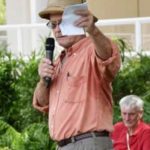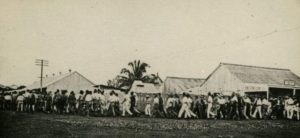CLA’s man in Darwin, Rob Wesley-Smith, delivered a semi-fiery rebellion history speech at a rally in December 2018 on the lawns outside the ancient NT Administrator’s House.

“Wearing my Pith Helmet No 227, and shaking my heavy walking stick crafted in Kangaroo Valley NSW, and following talks by Pat McIntyre, Austin Asche, John Hardy, Bruce Honeywill, and Jack Ellis, I reminded the audience of how the NT was one of the prime movers of revolution in Australia….and should be again,” Rob said.
Here is the gist of what he said in his speech: see below for the ABC’s report on the background to the recent rally, which commemorated a thirsty march for justice in 1919.
Aargh, fellow revolutionaries, and particularly recognising the revolutionary Excellencies* present here, Austin Asche, and John Hardy, and Ted Egan, represented today by his daughter, Margie,” Rob said.
* Administrators of the NT, the equivalent of Governors in the Australian States.
We in Darwin have a proud tradition of revolution, starting with this event 100 years ago, right after WW1, at the house over there (pointing to the still-standing, original, Administrator’s House, sometimes called Government House).
Darwinites were just about recovered from WW1 and our personal 1918 revolution, when a greater call came to help: WW2! Apart from the wharfies delaying delivery of essential war materials, we had no revolutions/rebellions during war. But, we had to endure the bombing of Darwin (and other areas) facilitated by the totally blasé attitudes of our leaders, including the one who resided here, in the Administrator’s House, back in 1918.
We endured long periods of just restoring Darwin after the two major wars, even while the then-dominant society continued the requirement that our Aboriginal friends remain outside mainstream society. Remember, Aboriginal ‘revolt’ in Australia began in the NT, more than 50 years ago, with Vincent Lingiari and the Gurindji people, who basically downed tools to go on strike.
But this old house, and the people who occupied it, have a proud place in the history of revolution of Australia.
A former occupant of this house, Ted Egan, created the St Mary’s Football Club, largely for Aboriginal footballers. Then that club was followed by the Wanderers club. Bold, revolutionary steps at the time.
Aboriginal people helped form, in secret, the Aboriginal Rights Council, which was facilitated by Brian Manning and Terry Robinson, and it also marched on Darwin. They got to Parap when Harry Giese (director welfare, controller of Aborigines and, later the NT’s first ombudsman) sent his staff member Ted Evans to ask them to stop, which they did (probably out of respect for Ted, a great bloke).
International invasions closer to Darwin than Canberra sparked rebellions up here on Australia’s front line.
For example, Vietnam. In 1970 a large anti-Vietnam War rally took place here, joining the moratorium marches Australia-wide that took place until Gough Whitlam was elected Prime Minister. He put an end to to the war, though no Australian or US reparations have followed. Australians did at least welcome and host boat people from that conflict, particularly Darwinites.
East Timor was invaded in 1975 and resistance activities for Australia were led here by the people: we were opposed by all federal and NT governments, from 1975 to 1999, when there was a people’s referendum, with Timor Leste voting 79% for independence.
In 1976, I was one of a few citizens who tried to take medical supplies to our neighbours who had already suffered nearly 100,000 deaths. But we were arrested and spent 13 days in court proving we should not be jailed for being humanitarians.
“On 4 July 1978 I was very happy to see a large gathering in Raintree Park, in the city centre, for an expected ‘Burn the Dog’ protest against use of US supplied Bronco OV10 aircraft dropping napalm on defenceless people, to little protest by governments. This revolutionary action was sparked by spreading an interesting idea in the media pre-event, the burning of a dog instead of a flag. But the dog turned out to be a toy, stuffed version…which is how you might describe the large police presence when the nature of the dog ‘victim’ of the fire became apparent.
After the Dili Massacre on 12 Nov 1991 another big crowd, supported by police and nearly everyone in the NT, saw 120 people lie on the road as corpses. To the delight of the TV news and the video camera brigade, they came to life to set off on a march to the Indonesian consulate in Stuart Park, where many camped on footpath verges until the anniversary of the invasion on 7 December.
One evening the crowd was joined by a line weaving down Westralia St of Elcho Island dancers, including noted musician Gurrumul’s father and other Yothu Yindi members. This was a great act of revolutionary solidarity, spoilt only by a police car forcing its way through the crowd. Police support for this protest activity had worn thin – one thing revolutionaries require is stamina!
Outside the Indonesian Embassy, now ensconced in the old Port Authority building, many demos and rallies were held, and many Indon flags were burned. At one rally in the late 1990s, a President Suharto effigy was incinerated: as the clothes burned away, a skull appeared with the jaw held in place by a string which itself burned in the flames, so that the jaw dropped open. Preparation for a successful revolution requires innovative thinking and time.
And we won, or at least the East Timorese, won !
But it was the pioneering revolution by the Gurindjis, led by Vincent Lingiari, against their virtual slavery as cattle baron workers on horseback, which ultimately led to land rights and many other victories, though there is still a way to go!
Revolutions need support from well-wishers, in this case notably initially by Brian Manning and the wharfies, with media support notably by Jim Bowditch and the people at the NT News.
My suggestion here, today, gathered outside the Administrator’s House, is to appoint a Gurindji as the next Administrator – in fact , I’ll even propose the accomplished Charlie King!
Are you with me? (muted response).
Are you with me?? (general response of support!)
I’ll take that as Unanimous!! Thankyouse all.
ENDS Robert Wesley-Smith speech.
The story of the 2018 commemorative rally:
Reporter Matt Garlick, of the ABC, told the story of the 2018 rally:
It’s a brave and foolish man who ups the price of beer (by about 20%) on Northern Territorians, and an even more unwise one who cuts off their shipment of Victoria Bitter just before Christmas.
But such was the lot in life for former Territory Administrator John Gilruth, whose heinous moves triggered the Darwin Rebellion of 1918, and eventually saw him driven out of the tropical town for good.

– NT Archive Service photo
The 1918 NT Revolution also saw a cargo of VB beer, bound for Singapore, unloaded to slake the thirst of the revolutionaries.
A revolutionary mood hung in the air near Government House in mid-December 2018 as a small band of battered warriors reflected on the events that took place on the same lawns 100 years earlier, on December 17.
Author Bruce Honeywill told the crowd, to audible groans, about the moment which sparked Gilruth’s downfall.
“A tallie (of beer) cost about $25 in current rates of 2018 — and Gilruth put it up to one (shilling) and ninepence, which is about $30,” Mr Honeywill said. Now that’s dear beer, so to speak,” Honeywell said, according to ABC reporter Matt Garlick.
But the moment marked the beginning of the end for Dr Gilruth — within two months of the rebellion he had received his marching orders from the Commonwealth, was stripped of his role and sent back “down south”.
The catalysts that lit the events of a century ago were eerily similar to circumstances taking place in the NT today, Garlick reported. The economy was in rigor mortis. The Commonwealth’s grip on Territory affairs was tightening. And, as if no time has trickled through the drain over the past 10 decades, beer remains as expensive as ever, said reporter Garlick, who is obviously a man with a journo’s thirst for truth and the occasional refreshing amber liquid. http://tinyurl.com/y7l2th4h


bluddy revolutionaries !!